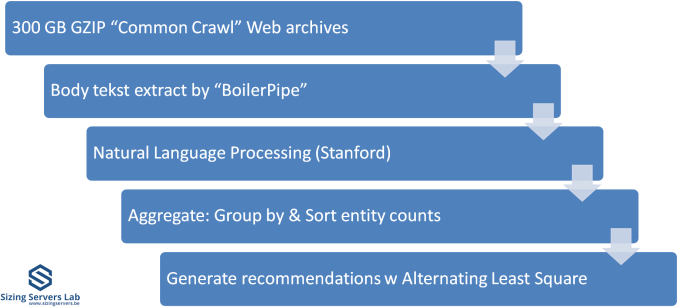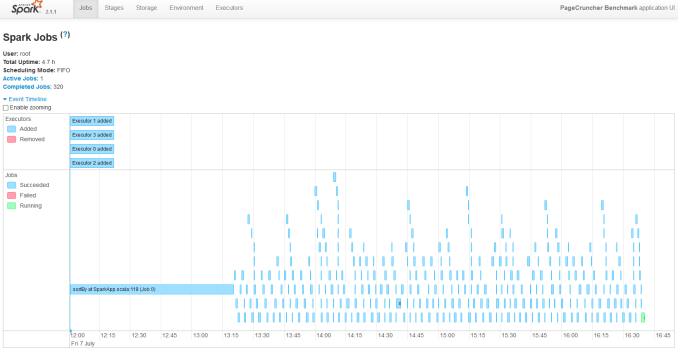Sizing Up Servers: Intel's Skylake-SP Xeon versus AMD's EPYC 7000 - The Server CPU Battle of the Decade?
by Johan De Gelas & Ian Cutress on July 11, 2017 12:15 PM EST- Posted in
- CPUs
- AMD
- Intel
- Xeon
- Enterprise
- Skylake
- Zen
- Naples
- Skylake-SP
- EPYC
Apache Spark 2.1 Benchmarking
Apache Spark is the poster child of Big Data processing. Speeding up Big Data applications is the top priority project at the university lab I work for (Sizing Servers Lab of the University College of West-Flanders), so we produced a benchmark that uses many of the Spark features and is based upon real world usage.
The test is described in the graph above. We first start with 300 GB of compressed data gathered from the CommonCrawl. These compressed files are a large amount of web archives. We decompress the data on the fly to avoid a long wait that is mostly storage related. We then extract the meaningful text data out of the archives by using the Java library "BoilerPipe". Using the Stanford CoreNLP Natural Language Processing Toolkit, we extract entities ("words that mean something") out of the text, and then count which URLs have the highest occurrence of these entities. The Alternating Least Square algorithm is then used to recommend which URLs are the most interesting for a certain subject.
In previous articles, we tested with Spark 1.5 in standalone mode (non-clustered). That worked out well enough, but we saw diminishing returns as core counts went up. In hindsight, just dumping 300 GB of compressed data in one JVM was not optimal for 30+ core systems. The high core counts of the Xeon 8176 and EPYC 7601 caused serious performance issues when we first continued to test this way. The 64 core EPYC 7601 performed like a 16-core Xeon, the Skylake-SP system with 56 cores was hardly better than a 24-core Xeon E5 v4.
So we decided to turn our newest servers into virtual clusters. Our first attempt is to run with 4 executors. Researcher Esli Heyvaert also upgraded our Spark benchmark so it could run on the latest and greatest version: Apache Spark 2.1.1.
Here are the results:

If you wonder who needs such server behemoths besides the people who virtualize a few dozen virtual machines, the answer is Big Data. Big Data crunching has an unsatisfiable hunger for – mostly integer – processing power. Even on our fastest machine, this test needs about 4 hours to finish. It is nothing less than a killer app.
Our Spark benchmark needs about 120 GB of RAM to run. The time spent on storage I/O is negligible. Data processing is very parallel, but the shuffle phases require a lot of memory interaction. The ALS phase does not scale well over many threads, but is less than 4% of the total testing time.
Given the higher clockspeed in lightly threaded and single threaded parts, the faster shuffle phase probably gives the Intel chip an edge of only about 5%.












219 Comments
View All Comments
deltaFx2 - Thursday, July 13, 2017 - link
"Can you mention one innovation from AMD that changed the world?" : None. But the same applies to Intel too, save, I suppose, the founders (Moore and Noyce) contributions to IC design back when they were at Fairchild/Shockley. That's not Intel's contribution. Computer Architecture/HPC? That's IBM. They invented the field along with others like CDC. Intel is an innovator in process technology, specifically manufacturing. Or used to be... others are catching up. That 3-yr lead that INtel loves to talk about is all but gone. So with that out of the way...AMD's contributions to x86 technology: x86-64, hypertransport, integrated memory controller, multicore, just to name a few. Intel copied all of them after being absolutely hammered by Opteron. Nehalem system architecture was a copy-paste of Opteron. It is to AMD's discredit that they ceded so much ground on the CPU microarchitecture since then with badly executed Bulldozer, but it was AMD that brought high-performance features to x86 server. Intel would've just loved to keep x86 on client and Itanium on server (remember that innovative atrocity?). Then there's a bunch on the GPU side (which INtel can't get right for love or money), but that came from an acquisition, so I won't count those.
"AMD exists because they are always inferior". Remember K8? It absolutely hammered intel until 2007. Remember Intel's shenanigans bribing the likes of Dell to not carry K8? Getting fined in the EU for antitrust behaviors and settling with AMD in 2010? Not much of a memory card on you, is there?
AMD gaining even 5-10% means two things for intel: Lower margins on all but the top end (Platinum) and a loss in market share. That's plain bad for the stock.
"Intel is a data center giant have head start have the resources...". Yes, they are giants in datacenter compute. 99% market share. Only way to go from there is down. Also, those acquisitions you're talking about? Only altera applies to the datacenter. Also, remember McAfee for an eye-watering $7.8 bn? How's that working out for them?
Shankar1962 - Wednesday, July 12, 2017 - link
Nvidia who have been ahead than Intel in AI should be the more competent threatHow much market share Intel loses depends on how they compete against Nvidia
Amd will probably gain 5% by selling products for cheap prices
Intel controls 98/99% share so it's inevitable to lose a few % as more players see the money potential but unless Intel loses to Nvidia there is annuphill battle for Qualcomm ARM.
HanSolo71 - Wednesday, July 12, 2017 - link
Could you guys create a Benchmark for Virtual Desktop Solutions? These AMD chips sound awesome for something like my Horizon View environment where I have hundreds of 2 core 4GB machines.Threska - Saturday, July 22, 2017 - link
For VDI wouldn't either an APU setup, or CPU+GPU be better?msroadkill612 - Wednesday, July 12, 2017 - link
Kudos to the authors. I imagine its gratifying to have stirred such healthy & voluminous debate :)milkod2001 - Thursday, July 13, 2017 - link
Are you guys still updating BENCH results? I cannot find there benchmark results for RYZEN CPUs when i want to compare them to others.Ian Cutress - Friday, July 14, 2017 - link
They've been there since the launchAMD (Zen) Ryzen 7 1800X:
http://www.anandtech.com/bench/product/1853
KKolev - Thursday, July 13, 2017 - link
I wonder if AMD'd EPYC CPU's can be overclocked. If so, the AMD EPYC 7351P would be very interesting indeed.uklio - Thursday, July 13, 2017 - link
How could you not do Cinebench results?! we need an answer!JohanAnandtech - Thursday, July 13, 2017 - link
I only do server benchmarks, Ian does workstation. Ian helped with the introduction, he will later conduct the workstation benchmarks.